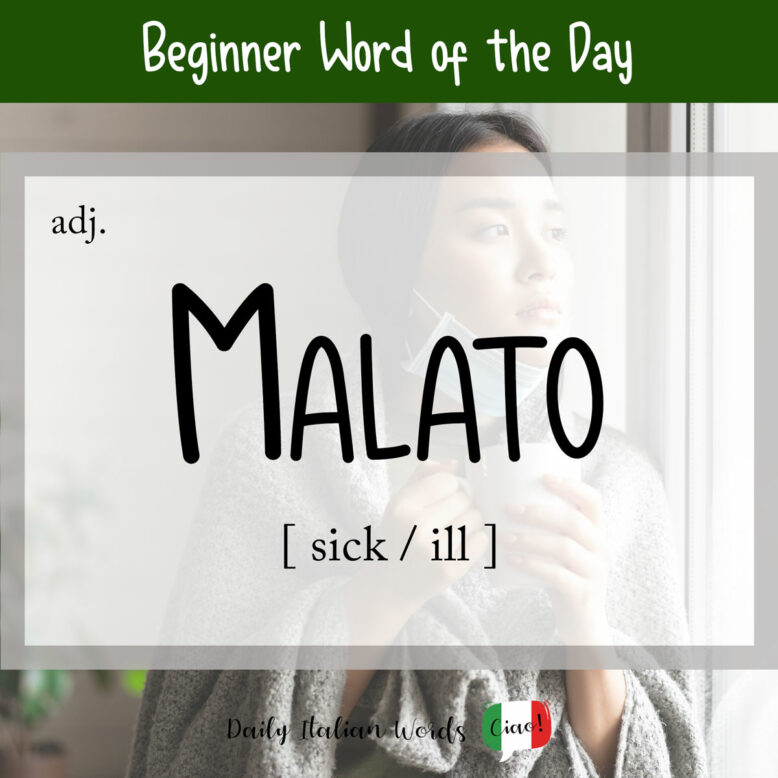One of the most common adjectives in Italian for someone who is sick or ill is malato. The feminine form is malata and their respective plurals are malati and malate. Just like its English equivalent, it can describe ailing plants and animals too.

If you are only suffering from a minor sickness, you can say that you are leggermente malato (mildly ill) whereas someone with a much more serious condition would be gravemente malato (seriously ill). Essere mezzo malato (lit: to be half-sick) is an expression used to say you’re not feeling well or just a little bit sick.
Non mi sembra il caso di andare al pronto soccorso se sei solo leggermente malato!
I don’t think it’s worth going to the ER if you are only mildly ill!
In order to say ‘to get sick‘ in Italian, you should use the verb ammalarsi, but in some regions, you may also hear cadere malato (lit: to fall ill). The expression ‘to feel sick‘ is best translated as:
- sentirsi male (to feel unwell)
- stare male (to be unwell)
- non sentirsi bene (to not feel well)
- sentirsi poco bene (to not feel very well)

Darsi (per) malato is what people do when they pretend to be sick to escape a duty of some sort, such as school or work.
When talking about specific diseases such as cancer (cancro) or asthma (asma) for example, you can say that someone is malato di (suffering from) + name of disease.
When referring to specific body parts that are diseased or injured, you can say essere malato di / a + name of body part. Alternatively, you can say avere un (body part) malato/a.
Giulia è malata di bronchite e Carlo ha il fegato malato. Che brutto momento che stanno attraversando!
Giulia is suffering from bronchitis and Carlo has a damaged liver. What a difficult time they’re going through!
Note that Italians also use the verb avere + name of the disease. For example, Marco has bronchitis translates as Marco ha la bronchite. If you want to say that you feel pain in a certain part of your body, you can say mi fa male + body part (e.g. mi fa male la gamba = my leg hurts).
The expression avere il cuore malato can be used in the literal sense of having heart disease, or figuratively to describe a lovesick person with a broken heart. Another way to say lovesick is essere malato d’amore (lit: to be sick with love).

In addition to physical illnesses, malato may also be used to describe abnormal, unnatural or disturbing tendencies. Someone who has una mente malata (a sick mind), for example, might be affected by dark thoughts or behave in a disturbing manner.
Un malato immaginario (lit: an imaginary sick person) is another way to say ipocondriaco (hypochondriac) in Italian.
One final figurative translation for malato as an adjective is ailing, used in reference to things that are corrupt, going through a turbulent period or experiencing a decline.
Viviamo in una società malata!
We live in an ailing society!
Like so many adjectives in Italian, malato can also be a noun that means sick person or patient. For example, a terminally-ill patient translates as un malato terminale.

Figuratively speaking, malato can mean fanatic or addict. Someone who is a massive soccer fan could be called un malato di calcio for example.
Malato vs ammalato
A very close synonym of malato is ammalato, which is also the past participle of the verb ammalarsi (to get sick). The two terms are interchangeable when humans are in question, but ammalato generally isn’t used to describe animals, plants, or non-living things such as businesses or societies.
Heather Broster is a graduate with honours in linguistics from the University of Western Ontario. She is an aspiring polyglot, proficient in English and Italian, as well as Japanese, Welsh, and French to varying degrees of fluency. Originally from Toronto, Heather has resided in various countries, notably Italy for a period of six years. Her primary focus lies in the fields of language acquisition, education, and bilingual instruction.


